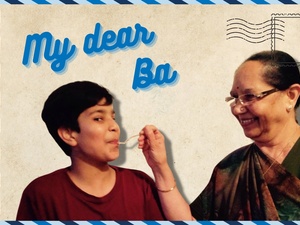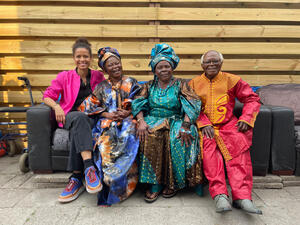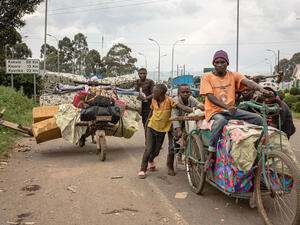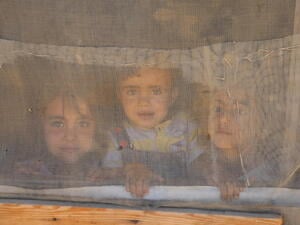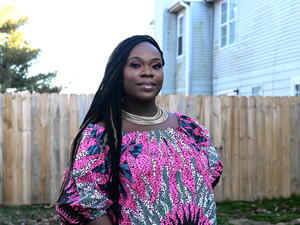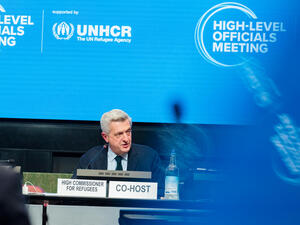Young Somali refugee born in exile looks forward to resettlement after a hard life
Young Somali refugee born in exile looks forward to resettlement after a hard life

Hodan gets ready to board a bus that will take her to Addis Ababa from Kebribeyah Refugee Camp.
KEBRIBEYAH REFUGEE CAMP, Ethiopia, October 1 (UNHCR) - Hodan Mawlid has spent almost all of her life in a baking, dusty refugee camp in Ethiopia, yet the 18-year-old remains remarkably optimistic despite suffering the loss of her parents at an early age and the hardship that followed.
"I have led a very painful life," she told a UNHCR visitor here recently. "But I always find solace in my belief that the best way to prevail over the cruelties and ills of the past is to forget them altogether and start all over again."
Now, things are changing for Hodan: last month she flew to the United States after being accepted for resettlement and her positive attitude should help her face the challenges that will arise in an alien land and culture. "Just how smooth the new beginning is depends so much on the individual and the situation," said UNHCR Senior Resettlement Officer Larry Yungk. "I think there tend to be opportunities out there, but there is no guarantee of success," he adds.
Hodan was among a group of 23 vulnerable Somali refugees, including her uncle and his family, who were accepted by the US under a UNHCR-organized resettlement programme and flown to Denver, Colorado. They cannot return home because they originate from volatile southern or central areas of Somalia, where people continue to flee their homes to escape conflict.
I've known suffering all my life. Compared to what I've endured, language and cultural barriers will be nothing to worry about.
Somali refugee Hodan Mawlid
Before leaving Addis Ababa, she said she knew there were tough times ahead, especially to begin with as she struggles to learn English. But she's had a lifetime of preparation. "I've known suffering all my life. Compared to what I've endured, language and cultural barriers will be nothing to worry about."
Hodan was born and brought up in eastern Ethiopia's Kebribeyah Refugee Camp after her parents crossed from neighbouring Somalia in 1991, fleeing the chaos that followed the collapse of the Siad Barre regime. They were among more than 600,000 people who fled to Ethiopia and found safety in eight refugee camps.
"When I grew old enough to enquire about my parents, I learnt from my uncle, who took care of me while in the camp, that my mother had died as a refugee when I was four years old and that my father returned to Somalia some months later," she recalled.
The news was a devastating blow, especially as Hodan had no siblings who could comfort her. Her uncle and aunt and their children became her surrogate parents and siblings, but she had to drop out of school after Grade Four to supplement the family's monthly food ration by working as a housemaid in a nearby town.
Meanwhile, relative stability in Somaliland and northern Somalia's Puntland led to the repatriation of well over half-a-million Somali refugees from Ethiopia between 1997 and 2005. But Hodan's kin were from southern Somalia where continuing insecurity has prevented their return. Resettlement became an option.
The Somalis still living in camps in eastern Ethiopia, including Hodan and her relatives, were caught in a protracted refugee situation with no end in sight. As part of the efforts to resolve the problem, the US government agreed in 2007 to accept thousands of these Somalis for resettlement. To date, UNHCR has referred the names of some 5,600 for possible resettlement.
"While UNHCR's primary purpose is to safeguard the rights and well-being of refugees, our ultimate goal is to help find durable solutions that will allow them to rebuild their lives in dignity and peace," explained Moses Okello, UNHCR's representative in Ethiopia.
The Somali community in the United States is closely-knit, UNHCR's Yungk noted, adding that this could help the young Hodan settle in well. Her biggest hurdle could be education.
"Unfortunately, if one is over 18 and arrives in the US, one is generally not eligible to finish public schooling," Yungk said, while adding that refugees like Hodan were usually steered towards General Equivalency Degree programmes, English-language courses and vocational training.
Hodan welcomed the opportunity for a new life with plenty of opportunity. There is no looking back for her. "I do not think I have any incentive to go to Somalia any time in the future," she concluded.
By Kisut Gebre Egziabher in Kebribeyah Refugee Camp, Ethiopia

